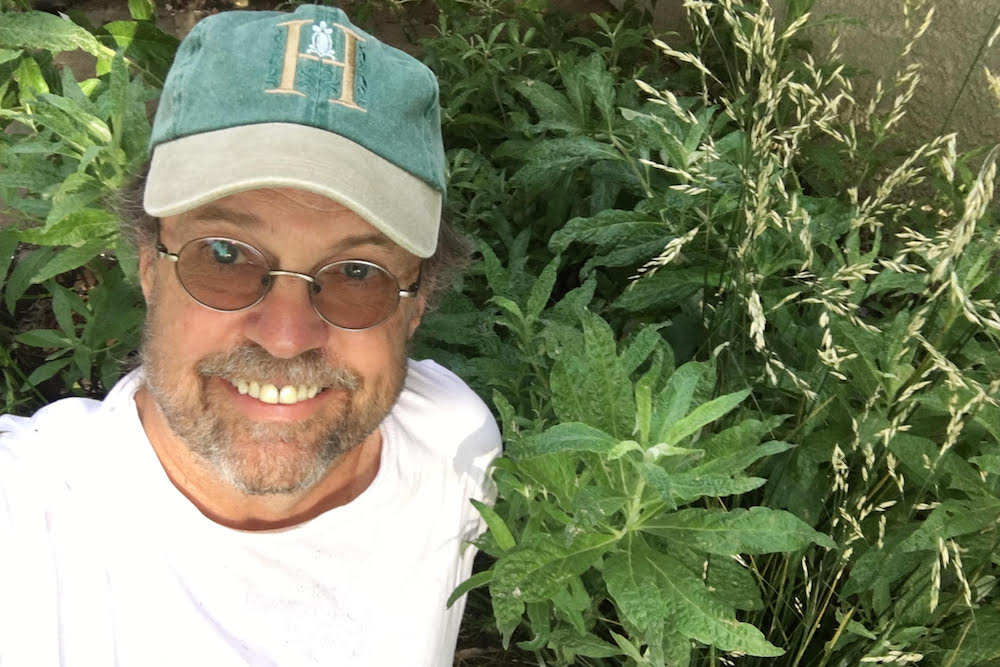
Jared Aldern photographed with California mugwort he planted himself. Courtesy of Jared Aldern.
Jared Dahl Aldern is a historical ecologist and a fire practitioner, who has worked in academia, K-12 education, and tribal government. An affiliated research scholar at the Huntington-USC Institute on California and the West, he has taught Native American history at Palomar College, San Diego State University, and Stanford University. Before taking part in a Zócalo/Huntington-USC Institute on California and the West event that asked “How Can Humans Coexist With Monster Wildfires,” Aldern talked in the virtual Green Room about caring for inherited roses in the Central Valley heat, knowing the right places to hike in the Sierra, and why it’s important to stay curious.
What do you wake up to?
I generally wake up to my dogs trying to wake me up. I have three dogs. They’re all mutts. I have a Manchester Terrier Dachshund mix. A Labrador Retriever mixed with Pitbull and, we think, Australian Cattle Dog, and then another Labrador Retriever mixed with we don’t know what. They sleep in their little cages, but they let me know when it’s time to go out. Sometimes, though, I have to let them out. I live in the Central Valley, and it’s important if we’re going to go for a walk to get that done before it’s 107 degrees outside, like it’s going to be today.
How early is early for you?
Well, today I got up at 4:30.
What surprises you most about your life right now?
I don’t have a lot of surprises. I’m in a pretty good routine. I’m retired from careers in education, research, and tribal government work. Being retired, there’s aren’t a whole lot of surprises.
Do you have a hidden talent?
No, I think all my talents are above board. I enjoy drawing. I haven’t done it in a disciplined way to develop a talent or an artistic vision, but my father was a painter, so I grew up around the visual arts, and I appreciate the visual arts.
Some friends or people have told me that they have a narration running through their heads as they think their way through the day. I don’t have an internal narrator. I have a whole bunch of visual images that are combining and recombining. So I’m not an artist but I am a visual thinker.
Do you have a favorite household chore?
I suppose yardwork. I just moved to this place two, three years ago, and I had never been responsible for maintaining roses before. But I have a couple dozen, 25—maybe even pushing 30—rosebushes. I have a long-time interest in California native plants, and I have a few of those that I’ve planted as well. But I feel an obligation to maintain these roses that someone else put a lot of effort into. So, I’ve been learning about and enjoying the gardening chores.
Where do you go to be alone?
Unusual for California, I have a nice basement I can retreat into. Speaking of the summer heat here in the Central Valley, that’s a really nice, cool, calm place to retreat to. But generally, my instinct would be to get out and go out to the Sierra. It’s a really short drive to get to some really nice places where there aren’t a lot of people. Although with the pandemic, and everyone at home going stir-crazy and trying to get out, the trails have been full of people trying to avoid each other. So you have to know the right places, and the right time of day to go.
What’s the strangest job you’ve ever had?
I was a driller for the South Dakota State Geological Survey, so that was a very muddy job trying to find new water sources for municipalities all over the state of South Dakota.
How do you procrastinate?
For the longest time I didn’t have TV. I still don’t have cable TV. But what I have is a little TV antenna, and I bring in broadcast TV. Since the digital revolution, it’s interesting to see all the funky channels that they have, like movie channels that only show stuff from the ’80s.
What’s the best advice you’ve ever received?
When I was an elementary school teacher, the best advice I ever got was: “Never argue with a 9-year-old.” But here’s a piece of advice I got from my dad, the painter. When I was drawing, he told me, “Jared, a painting isn’t done until you’re done asking questions about it. That’s when you know you’re done.” Basically he was saying, you know you’re done with something when you are no longer curious about it. So I’ve extended that, I think, into my historical research, and my collaborations with Native American tribes on ecological restoration, and other parts of my life.



